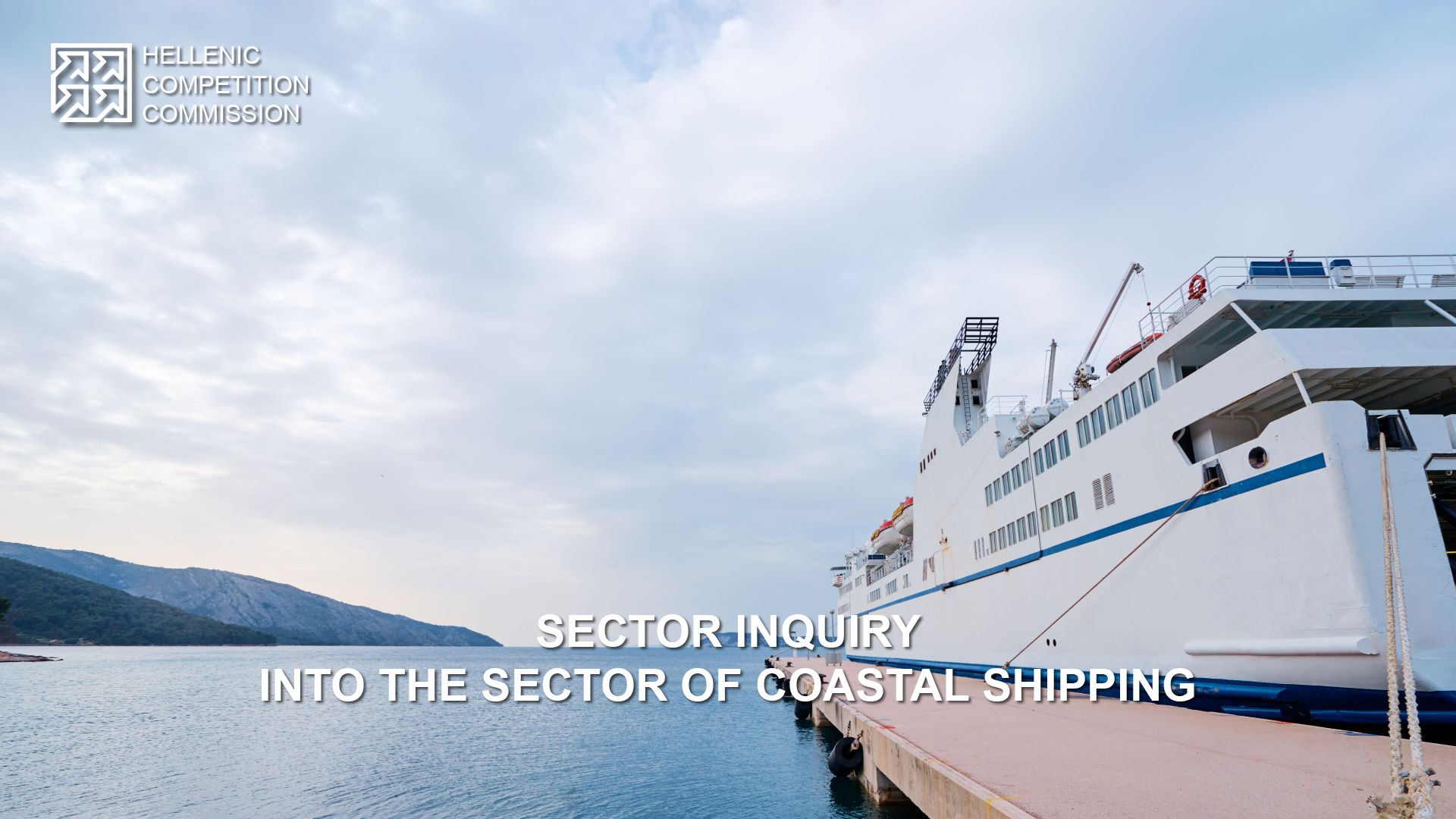The Hellenic Competition Commission (HCC), taking into account the importance of Greek coastal shipping to the national economy and social cohesion, the structure of the domestic coastal shipping industry and the evolution observed in ferry ticket prices, decided, on 15.04.2025, to initiate a sector inquiry into the respective industry, exercising its relevant competence under Article 40 of Law No. 3959/2011.
The Greek coastal shipping issue
Coastal shipping is a pivotal sector not only to the Greek economy but also to the territorial and social cohesion of our country.
On the one hand, due to the country’s particular semi-insular geography, coastal shipping is the main means of inter-island domestic transport of goods and passengers. Therefore, it plays a vital role in the country's territorial cohesion, while also contributing to export trade through the international Adriatic routes. The conditions of transport and its quantitative and qualitative characteristics determine the country’s geographical continuity and have a decisive effect on the level of economic, social and population development of the island regions. Consequently, the maritime transport service practically acquires the quality of a public service of general interest, a service which, for reasons of public interest, must be sufficiently, if not uninterruptedly provided, as it is a key aspect of promoting economic, social and territorial cohesion as well as sustainable development of the island regions.
On the other hand, private economic operators provide coastal transport services, therefore it must be an economically sustainable activity. The two functions often come into conflict with each other, and the issue is further complicated by the plethora of small and remote islands and the intense seasonality of demand: providing uninterrupted services to less accessible areas is not necessarily consistent with the profit-driven business logic of market players.
Concerns raised by the HCC’s preliminary investigation
The HCC’s preliminary investigation, which was assisted by the dedicated market-mapping tool (Article 14 (2) (s)), raises the following concerns regarding the coastal shipping sector:
Competition in the coastal shipping market presents oligopolistic characteristics with two large companies/groups holding 60% of the medium and long-distance coastal shipping fleet. Despite the full liberalisation of the market after the lifting of cabotage restrictions (gradually introduced from 2002 onwards), the quality of coastal shipping services (as reflected in the age of the fleet, the trip duration, etc.) as well as the accessibility of a number of islands remain low (except for those with increased boating tourism), while there are no signs of competition enhancing and new market entries.
- The existing institutional framework for market operation and, in particular, the rules on (free) routing procedures leave plenty of room for distortions and reduced competition based on the business plans and strategies of the coastal shipping companies, especially with regard to the rational planning of the maritime transport network, the effective provision of quality transport services and, ultimately, ferry services prices.
- In view of the free routing rules, a supplementary corrective mechanism for public service contracts is now necessary to cover the needs of the island regions, which indicates inefficiencies in the existing operation of the free market for ferry services and increases the cost of island ferry services to the state budget. It is significant that the cost of such contracts to the State budget is estimated to have increased in absolute terms by 1400% from market liberalisation to date (from EUR 10 million in 2001 to EUR 152 million in 2024).
- The shipping network has now been developed into a star network with the port of Piraeus as its central hub. This fact, together with the direct and complementary linkage between ports and ferry services in the context of a single network value chain, combined with the chronic deficiencies throughout the country's port infrastructure and, in particular, in island ports, affects the provision of ferry services, both in terms of service supply and demand satisfaction, and has a deterrent effect on improving the efficiency of the sector.
- The continuous restructuring and change of the supervisory bodies of the Greek ferry market raises concerns about the creation of an unstable supervisory landscape, with possible overlapping and conflicting responsibilities, as well as of an inconsistent regulatory framework at national level.
Through its sector inquiry, the Hellenic Competition Commission will investigate in depth the above preliminary observations and the competitive conditions in the Greek shipping sector in general, in order to identify any distortions and to make proposals to enhance competition in the market.
This sector inquiry is independent of the ongoing cases on possible infringements of Law 3959/2011 and/or the Treaty on the Functioning of the European Union by undertakings operating in the shipping sector, for which press releases[1] were issued following the relevant unannounced inspections conducted in September 2024.
[1]In September 2024: https://www.epant.gr/en/information/press-releases/item/2928-press-release-dawn-raids-carried-out-by-the-hcc-in-the-ferry-connection-of-perama-attica-paloukia-salamis.html and in March 2025: https://www.epant.gr/en/information/press-releases/item/3117-press-release-unannounced-inspections-of-the-hellenic-competition-commission-in-the-maritime-transport-sector.html.

